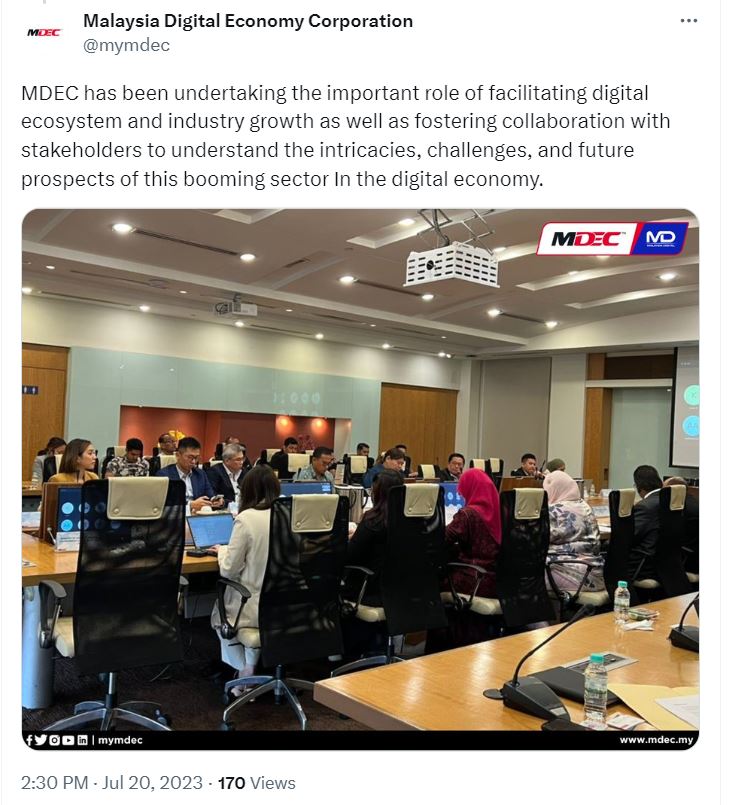
Increasing cloud services adoption in Malaysia. (Image – Shutterstock)
Increasing adoption of cloud services in Malaysia
Cloud services in Malaysia continue to experience growth, especially with local enterprises looking to embrace digitalization and have an edge over their competitors. Cloud services in Malaysia picked up during the pandemic as businesses needed to ensure business continuity and also remain relevant in their respective industries.
Globally, rapid growth in cloud infrastructure spending in Malaysia still represents a small fraction of the global US$2.4 trillion market for enterprise IT services.
In Malaysia, the demand for cloud services has also seen the government granting approvals for more data centers to support the infrastructure. For example, in February 2021, Malaysia’s government approved the building of new data centers by Amazon Web Services (AWS), Google Cloud, Microsoft Azure, and Telekom Malaysia on Malaysian soil, following its cloud-first strategy and the Malaysian Digital Economy Blueprint.
According to Forrester’s The State of Cloud in Malaysia in 2023 report, the increased presence of hyperscalers provides a landing zone for firms seeking access to the country’s nearly 27 million online consumers. While Malaysian enterprises have previously experimented with the cloud, in-country public cloud capacity is increasing interest in migration.
“Malaysia has made some significant changes to its economic openness in the last decade and exploited its lack of legacy infrastructure found in some more mature economies to invest strategically in digital infrastructure – mimicking and potentially surpassing Singapore in the longer term. Much of this success when it comes to both domestic and international cloud adoption can be attributed to the efforts of the Malaysia Digital Economy Corporation (MDEC) over the last 10 years which have focused on ensuring that there is private cloud capacity and an attractive business environment for the increasing interest from international public cloud hyperscalers,” commented Sam Higgins, Principal Analyst at Forrester.

Sam Higgins, Principal Analyst at Forrester.
The report highlights several trends for cloud services in Malaysia. The first is the types of cloud services being used in the country. 65% of Malaysian enterprise cloud decision-makers are using at least two cloud deployment models. This includes the use of the hybrid cloud and the public cloud. 84% of those using the public cloud use two or more vendors, which is not surprising given the different needs and use cases of each cloud. Examples of companies using the public cloud in Malaysia include Standard Chartered Bank and Tenaga Nasional.
“While many Malaysian businesses do not face the drag of legacy infrastructure or vendor lock-in that occurs in some more mature economies across APAC, there is always a concentration risk if only one or two public cloud providers are available locally. One challenge for Malaysian technology leaders is to deliver on the demand from their business counterparts for cheaper more cost-effective solutions than those offered by traditional on-premise approaches. Indeed, in Malaysia, this is the number one reason given by Malaysian business leaders for why they wanted to adopt cloud computing,” he added.
Secondly, businesses that are migrating their data and services prefer to use the public cloud due to its scalability. This is because Malaysian enterprises migrating existing workloads can build new apps on major public cloud providers’ state-of-the-art data centers and have a lower total cost of ownership. Examples of companies that have done this include Caring Pharmacy, Celcom, and the Department of Statistics Malaysia have all migrated workloads to the public cloud. On average, Malaysian enterprise cloud decision-makers say that they have migrated 48% of their total application portfolio to a public cloud and plan to have migrated 64% there in the next two years.
The next trend is a rather interesting one. Despite the increasing adoption of cloud services in Malaysia, Alibaba is the only major cloud player with a cloud region in the country. Microsoft Azure has announced a US$1 billion investment and plans to host a cloud region in Kuala Lumpur. AWS, Google Cloud, and Telekom Malaysia also plan to build data centers in the country. In fact, AWS is promising to invest US$6 billion in Malaysia by 2037. For now, organizations rely on nearby regions in Indonesia and Singapore where the Personal Data Protection Act is not an issue.

Malaysian enterprises migrating existing workloads can build new apps on major public cloud providers’ state-of-the-art data centers and have a lower total cost of ownership. (Image – Shutterstock)
At the same time, the report also indicated that Malaysian cloud decision-makers at enterprises that are adopting or implementing cloud most often said that they did so to improve disaster recovery and business continuity, gain access to fast, easy development resources and get support for sustainability efforts. Malaysia has already witnessed record-breaking data breaches in recent months so it’s no surprise their resiliency is a key factor in their decision-making process. Cybersecurity remains a major concern in the country and Malaysian businesses are finally realizing the benefit of the cloud for backup and recovery services.
“Malaysia is not immune to the increasing instances of cyber security incidents. Globally, despite the best efforts of many hard-working technology professionals, the increasing value of the digital economy – estimated by the US International Trade Administration to be 25% of the country’s GDP – makes theft of personal and commercial data highly attractive to criminals who can operate anywhere in the world.
That said, there is recognition that governments in partnership with the private sector can and should be doing more when it comes to protecting the digital sovereignty of its citizens. For this reason, we see increasing efforts to drive up the capability and competency of both public institutions and private companies to address these threats. It is important to note that while adopting cloud services can improve the security of the underlying infrastructure – security of the cloud – the shared responsibility model means there is always a need for firms using the cloud to address their own unique security profiles and ensure security in the cloud,” explained Higgins.

MDEC has been facilitating conversations for cloud services in Malaysia.
Other trends of the report include:
- Modernization enhances migration strategies – While migration is one of the factors for increasing cloud adoption, businesses in Malaysia are also modernizing their products and services. As such, they look to the cloud to help modernize their core apps. Forrester’s 2022 data shows that 38% of Malaysian enterprise cloud decision-makers expect to prioritize extending their data center or modernizing existing apps and services over the next 12 months. These firms use a mix of tools like cloud-native services, Kubernetes, AI, and machine learning to rework apps and employ approaches like Strangler patterns, re-platforming, and integration to modernize their code.
- Third parties are valued for their cloud skills – The lack of skills is a global problem. Hence the need for managed cloud services, as well as global system integrators, to fill the void. Around 30% of enterprise cloud decision-makers in Malaysia say that their organizations use third-party service providers to run cloud operations, provide integration services, or develop cloud strategies
- The rise of cloud-native technologies – Cloud-native environments like containers, serverless, and service mesh reach new levels of scale globally. In Malaysia, half of the infrastructure decision-makers at Malaysian enterprises say that their organizations have adopted containers within the platform as a service, whether that’s in the cloud or on-premises.
“Increasingly as inflation has begun to bite globally cloud providers – who themselves have felt the pressure of chip shortages, increasing input costs and other economic uncertainty – have begun to tie pricing closer to the US$. As a result, some countries are seeing both a price increase and a dilution of buying power through weakening exchange rates. For example, Microsoft announced earlier this year it would start to update local prices in response to fluctuating currencies relative to the USD. This combined with the price increase is increasing the interest by firms in “cloud repatriation” and while the trend has not yet taken hold to a perceptible amount in the region there is no doubt the continued economic headwinds may damp uptake over the next 12 months,” Higgins concluded.
READ MORE
- Enhancing Business Agility with SASE: Insights for CIOs in APAC
- 3 Steps to Successfully Automate Copilot for Microsoft 365 Implementation
- Trustworthy AI – the Promise of Enterprise-Friendly Generative Machine Learning with Dell and NVIDIA
- Strategies for Democratizing GenAI
- The criticality of endpoint management in cybersecurity and operations


